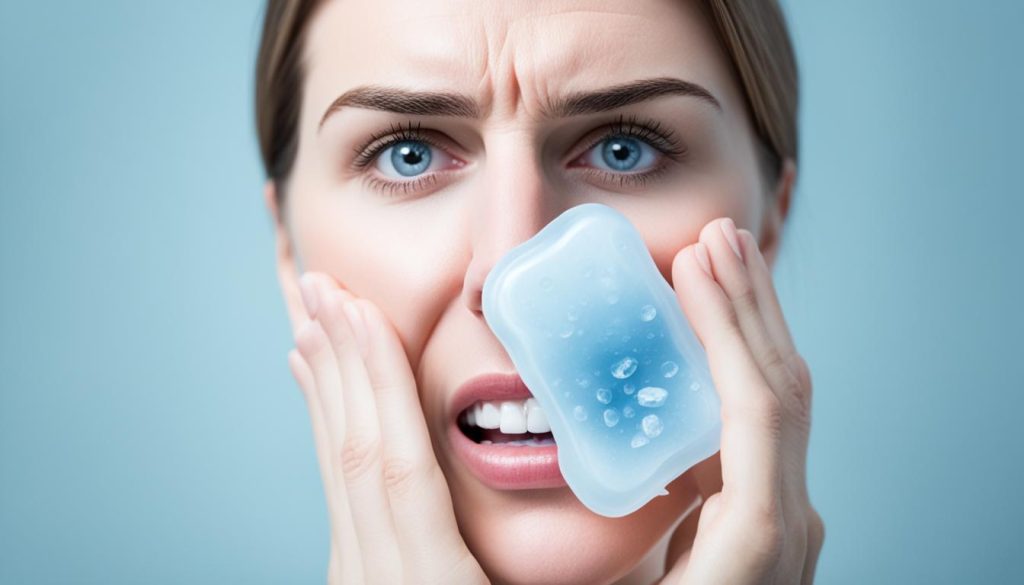Are you wondering how long it takes for your wisdom teeth to heal after extraction? The wisdom teeth recovery time can vary from person to person, but typically it takes up to 2 weeks for a complete healing process. During this time, it is important to understand the wisdom teeth extraction healing process and what to expect.
After getting your wisdom teeth removed, you may experience common symptoms such as swelling, bruising, soreness, pain, an unpleasant taste in the mouth, and even numbness or tingling in the face. These symptoms can be managed with self-care tips and proper oral hygiene.
To ease the discomfort during the recovery period, you can use painkillers as recommended by your dentist or oral surgeon. It is also important to avoid strenuous activities and support your head with an extra pillow while resting. Taking care of your oral hygiene, including gentle brushing and rinsing, is crucial for a smooth healing process.
The key is to be patient and monitor your progress. While some people may heal faster, others may take the full two weeks to recover completely. If you experience excessive bleeding or severe pain, it is important to report these symptoms to your dentist or oral surgeon immediately.
By understanding the wisdom teeth recovery time and following the necessary self-care measures, you can ensure a smooth healing process and get back to your normal routine as soon as possible.
Swelling and Bruising After Wisdom Teeth Removal
After undergoing wisdom teeth removal, it’s common to experience swelling and bruising in the mouth and cheeks. This swelling can be more pronounced during the first few days following the procedure. However, there are ways to manage and reduce the swelling, allowing for a more comfortable healing process.
To alleviate swelling, applying a cold cloth or ice pack to the affected area can be helpful. The cold temperature helps constrict the blood vessels, reducing inflammation and minimizing swelling. It’s important to wrap the ice pack or cloth in a thin towel to protect the skin from direct contact with the cold source.
In addition to swelling, bruising may also be visible after wisdom teeth removal. Bruises typically appear as areas of discoloration around the extraction site and may last up to 2 weeks. While it can be concerning to see bruising, it’s a normal part of the healing process. Over time, the bruised areas will gradually fade as your body repairs itself.
Healing duration for wisdom teeth removal can vary from person to person. On average, it takes about 1-2 weeks for the mouth to fully heal following the extraction. During this time, it’s essential to follow your dentist or oral surgeon’s post-operative instructions and take proper care of the extraction site.
| Managing Wisdom Teeth Swelling | Healing Duration for Wisdom Teeth Removal | Wisdom Tooth Extraction Healing Process |
|---|---|---|
| Apply cold cloth or ice pack on the face | 1-2 weeks | Follow post-operative instructions |
| Avoid hot liquids or foods that can aggravate swelling | Take prescribed medications | |
| Elevate the head with an extra pillow while resting | Gently rinse mouth with saltwater solution |
By effectively managing wisdom teeth swelling and following the recommended healing process, you can ensure a smooth and comfortable recovery. However, it’s important to note that if you experience excessive swelling, severe pain, or any other concerning symptoms, you should contact your dentist or oral surgeon for further guidance.

Expert Insight
“Swelling and bruising are common after wisdom teeth removal due to the body’s natural response to injury. However, following proper care instructions and utilizing techniques such as cold compresses can help reduce swelling and promote healing.” – Dr. Emily Johnson, DDS
Managing Pain and Discomfort After Wisdom Teeth Removal
After wisdom teeth removal, it is common to experience pain and discomfort as part of the healing process. Fortunately, there are several strategies you can employ to find relief and promote faster recovery. Here are some helpful tips:
1. Use Over-the-Counter Painkillers
To alleviate wisdom teeth pain, you can take over-the-counter painkillers such as paracetamol or ibuprofen. It is important to follow the recommended dosage instructions provided by the manufacturer. Many dental professionals consider ibuprofen to be particularly effective in managing post-wisdom teeth removal pain.
2. Rest and Avoid Strenuous Activity
Resting and avoiding strenuous activities can significantly contribute to a faster recovery. Take it easy for the first few days following the surgery. Engaging in activities that require physical exertion can disrupt the healing process and prolong discomfort.
3. Elevate Your Head With an Extra Pillow
Using an extra pillow to elevate your head while resting can help reduce pain and swelling. By keeping your head slightly elevated, you can minimize blood flow to the surgical site and alleviate discomfort.
4. Consume Soft or Liquid Foods
During the initial stages of the healing process, it is advisable to stick to soft or liquid foods. These types of foods are easier to consume and minimize the risk of irritation or injury to the surgical area. Be sure to avoid hot or spicy foods that may cause additional discomfort.
5. Rinse Your Mouth With Antiseptic Mouthwash
Regularly rinsing your mouth with antiseptic mouthwash can help keep the extraction site clean and reduce the risk of infection. Be gentle while rinsing and make sure not to disrupt any blood clots that may have formed.
| Pain Relief Tips | Additional Notes |
|---|---|
| Use over-the-counter painkillers | Paracetamol or ibuprofen can provide relief |
| Rest and avoid strenuous activity | Allow your body adequate time to heal |
| Elevate your head with an extra pillow | Reduces swelling and discomfort |
| Consume soft or liquid foods | Minimize irritation to the surgical area |
| Rinse mouth with antiseptic mouthwash | Promotes cleanliness and reduces infection risk |

By following these pain relief tips and taking proper care of yourself, you can manage the discomfort associated with wisdom teeth removal and support a faster recovery. However, if you experience severe or persistent pain, excessive bleeding, or any other unusual symptoms, be sure to consult your dentist or oral surgeon for further guidance.
How Long Does It Take for Wisdom Teeth to Heal?
After undergoing wisdom teeth removal, it is important to understand the recovery timeline and what to expect during the healing process. The time it takes for complete healing can vary from person to person, but generally ranges from 3 days to 2 weeks. Let’s take a closer look at the different stages of wisdom teeth surgery recovery:
Day 1: Post-Surgery Symptoms
The first day after wisdom teeth removal is typically the most uncomfortable. It is common to experience swelling, pain, and bleeding in the mouth. This is a normal part of the healing process and can be managed with pain medication prescribed by your dentist or oral surgeon.
Days 2-4: Increased Symptoms
During the next few days, the swelling, pain, and bleeding may increase before gradually subsiding. It is important to follow the post-operative care instructions provided by your dentist or oral surgeon to minimize discomfort and promote healing. Make sure to rest and avoid any strenuous activities that could interfere with the healing process.
Days 5-7: Nearing the End of Recovery
By days 5-7, most people are nearing the end of their recovery journey. Swelling and bruising should be minimal, and any residual pain can be managed with over-the-counter pain medication. It is important to maintain good oral hygiene practices during this time, gently brushing your teeth and rinsing your mouth with an antiseptic mouthwash as recommended by your dentist.
Up to 2 Weeks: Complications and Impacted Teeth
In some cases, the healing timeline can extend beyond the typical 1-2 week period. This is especially true if the wisdom teeth were impacted or if there were any complications during the surgery. If you have any concerns or experience unusual symptoms during your recovery, it is crucial to reach out to your dentist or oral surgeon for further evaluation and guidance.
Remember, everyone’s healing timeline may vary, and it is important to be patient and give your body the time it needs to recover fully.
Post-Op Care and Recommendations for Wisdom Teeth Healing
Once your wisdom teeth have been removed, proper post-operative care is essential for a smooth and successful healing process. Follow these tips to ensure optimal healing and minimize discomfort:
- Avoid rinsing, spitting, or using a straw for the first 24 hours after surgery. These actions can dislodge the blood clots that form in the empty tooth sockets, leading to a painful condition called dry socket.
- Avoid consuming hot drinks and foods, as they can also disturb the blood clots and hinder the healing process.
- Avoid smoking and drinking alcohol for at least 72 hours after the procedure. These habits can delay healing and increase the risk of complications.
- Stick to a soft or liquid diet for the first few days to avoid putting excessive pressure on the extraction sites. Opt for foods like yogurt, smoothies, mashed potatoes, and soup.
- Rinse your mouth gently with an antiseptic mouthwash 24 hours after the surgery. This helps keep the extraction sites clean and reduces the risk of infection.
- Maintain good oral hygiene by brushing your teeth carefully and avoiding the extraction sites. Use a soft-bristled toothbrush and be gentle to prevent discomfort and bleeding.
- Attend all follow-up appointments with your dentist or oral surgeon. They will monitor your healing progress and address any concerns or complications that may arise.
By following these post-operative care instructions, you can reduce the risk of complications and promote a faster and smoother healing process for your wisdom teeth extraction.
Remember, everyone’s healing process is unique, so be patient and give your body the time it needs to recover fully.
Sample Table: Foods to Include and Avoid During Wisdom Teeth Healing
| Recommended Foods | Avoid These Foods |
|---|---|
| Yogurt | Hard candies |
| Smoothies | Chips and pretzels |
| Mashed potatoes | Crunchy fruits and vegetables |
| Soup | Spicy or acidic foods |
| Applesauce | Chewing gum |
Stick to soft, easy-to-eat foods that require minimal chewing to avoid irritating the extraction sites. It’s important to avoid any foods that may get stuck in the sockets or cause discomfort. Gradually reintroduce solid foods as your healing progresses and you feel comfortable doing so.

Returning to Normal Activities After Wisdom Teeth Removal
After wisdom teeth removal, it is important to give yourself some time to rest and recover. Taking a day or two off from work or school can help you heal more comfortably and quickly. Driving immediately after the procedure is usually possible if local anesthesia was used. However, if a sedative or general anesthesia was administered, it’s best to avoid driving for at least 24 hours to ensure your safety.
Once the initial swelling and bruising subside, which typically occurs within a week, you can gradually resume your normal activities. It’s important to listen to your body and avoid overexertion during this healing period. If you experience any unusual or severe pain, it’s recommended to consult your dentist or oral surgeon.
Brushing Teeth After Wisdom Tooth Extraction
Brushing your teeth is an essential part of maintaining good oral hygiene even after wisdom teeth removal. However, it’s important to wait a few days before brushing the surgical area. Be gentle while brushing to avoid disturbing the healing process. Remember, the extraction site may still be sensitive, so it’s important to use care and caution. If you have any concerns or questions about brushing, don’t hesitate to ask your dentist or oral surgeon.
Sutures Removal
During your follow-up appointment, your dentist or oral surgeon will assess your healing progress. If you had stitches placed during the procedure, they may be removed at this time. The removal process is usually quick and painless, and it allows for further evaluation of your healing. Your dental professional will provide guidance on ongoing care and any additional recommendations based on your specific situation.
| Activity | Timeline |
|---|---|
| Resting | 1-2 days |
| Driving (if local anesthesia) | Immediately after the procedure |
| Avoiding driving (if sedative or general anesthesia) | At least 24 hours |
| Resuming normal activities | After swelling and bruising subside (typically within a week) |
| Brushing teeth | After a few days, being gentle around the surgical area |
| Sutures removal | During follow-up appointment |
Returning to your normal activities after wisdom teeth removal can vary based on individual healing rates and any specific complications experienced. It’s essential to follow your dentist’s or oral surgeon’s instructions and attend all scheduled follow-up appointments to ensure a smooth recovery.

Conclusion
The recovery period after wisdom teeth removal generally lasts up to 2 weeks. During this time, symptoms such as swelling, bruising, pain, and numbness gradually improve, allowing patients to return to their daily routines. However, it is important to manage pain effectively, follow post-operative care instructions diligently, and maintain good oral hygiene for a smoother healing process.
By managing pain with appropriate painkillers and adopting self-care practices, patients can experience a faster and more comfortable recovery. It is crucial to report any complications or unusual symptoms to a dental professional or healthcare provider for immediate attention. With proper care and attention, individuals can navigate the healing process confidently and ensure optimal wisdom teeth recovery.
Overall, the road to wisdom teeth healing may present some challenges, but with patience and adherence to post-operative instructions, individuals can achieve a successful recovery. Remember to take the necessary time to rest, maintain a soft or liquid diet, and avoid strenuous activities. By prioritizing self-care and seeking professional support when needed, the journey towards full wisdom teeth recovery can be smoother and more manageable.




